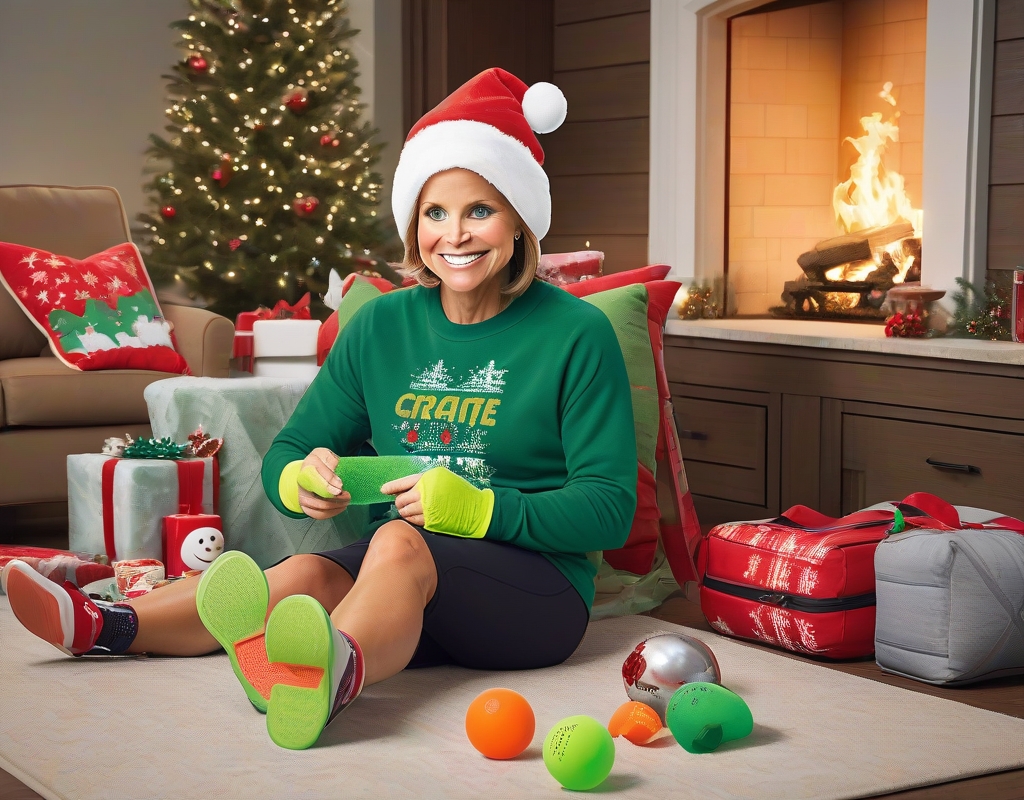Katie Couric, a name synonymous with seasoned broadcasting, recently ventured beyond her professional realm, engaging in an incident that balanced playful competition with a slight misfortune. This holiday season, she faces a new kind of challenge, slightly more whimsical in nature, as she recovers from an encounter with her pickleball paddle, embracing the adage “grin and bear it” quite literally.
During a game of pickleball, a sport that has rapidly grown in popularity across the United States, Couric inadvertently struck herself in the head with her paddle, resulting in a significant bruise. She shared this experience on social media, posting a snapshot of herself with an ice pack on her head, humorously noting the mishap to her followers. The incident offered a rare glimpse into a less polished side of Couric, known for her poise and articulate reporting.
Pickleball, a sport that originated in the 1960s, ingeniously blends elements of tennis, badminton, and table tennis into a game that can be enjoyed on a court smaller than a tennis court, using paddles and a perforated plastic ball. It’s a sport that appeals to a broad demographic, attracting celebrities such as Taylor Swift and Michael Phelps due to its accessible play and minimal equipment requirements. Recent data from the Sports & Fitness Industry Association has highlighted an annual increase in participation by 21.3%, a testament to its burgeoning appeal.
Despite its accessibility and fun, pickleball is not without its risks, especially for those new to racquet sports or for older participants. The same physical engagement that makes it appealing also poses potential injury risks. Couric’s unfortunate encounter with her paddle underscores these risks. Recent studies have noted a significant rise in pickleball-related injuries, correlating with its growing popularity. Injuries can vary from minor bruises or cuts to more severe cases like fractures or joint injuries, reflecting a 200% increase in hospital visits over five years linked to pickleball.
However, experts in sports medicine advocate for proactive measures to mitigate these risks. According to Dr. Lisa DeStefano, enhancing core strength and flexibility can majorly assist in managing the sport’s demands effectively. Pre-engagement with physical health programs, particularly those designed for older adults, can also help prevent common injuries related to physical unpreparedness. Jamie Neely, a sports injury specialist, emphasizes the benefits of consulting with physiotherapists prior to taking up such sports. Understanding bodily limits and working on improving one’s physical condition beforehand can decrease the likelihood of injuries.
Despite her mishap, Couric’s response was filled with humor and resilience. Her social media posts not only reflected her enduring spirit but also her determination to continue engaging with the sport, albeit with possibly more protective gear like a helmet. This incident provided an opportunity for camaraderie and support from peers, emphasizing another attractive aspect of pickleball—the social interaction it fosters among players.
Couric’s commitment to pickleball remains steadfast after the incident, demonstrating the sport’s mental and physical benefits outweigh the occasional accident. Her experience serves as a powerful reminder of the perseverance required in sports and the humor needed to overcome setbacks.
The sport’s scope extends far beyond the U.S., with a rapidly growing following in Europe, Canada, and Asia. It’s recognized for its inclusivity, welcoming participants from all backgrounds and skill levels, making it uniquely universal. The International Federation of Pickleball is even advocating for its inclusion in international competitions like the Olympic Games, aiming to transition pickleball from a recreational pastime to a globally recognized competitive sport.
Katie Couric’s encounter with pickleball, while initially bruising, ultimately underscores a heartier narrative of resilience, humor, and the sport’s community spirit. It’s a reminder that sometimes, life’s little accidents provide opportunities for laughter, learning, and personal growth. As pickleball continues to capture hearts and competitive spirits worldwide, it promises more than just a physical workout—it offers a platform for cherished memories and lifelong connections.
Through her brief ordeal and subsequent recovery, Couric exemplifies the enriching, although sometimes hazardous, adventures that come with embracing new challenges. Her story resonates as a microcosm of the broader cultural embrace of pickleball, marrying competitive spirit with a dose of playful risk.




